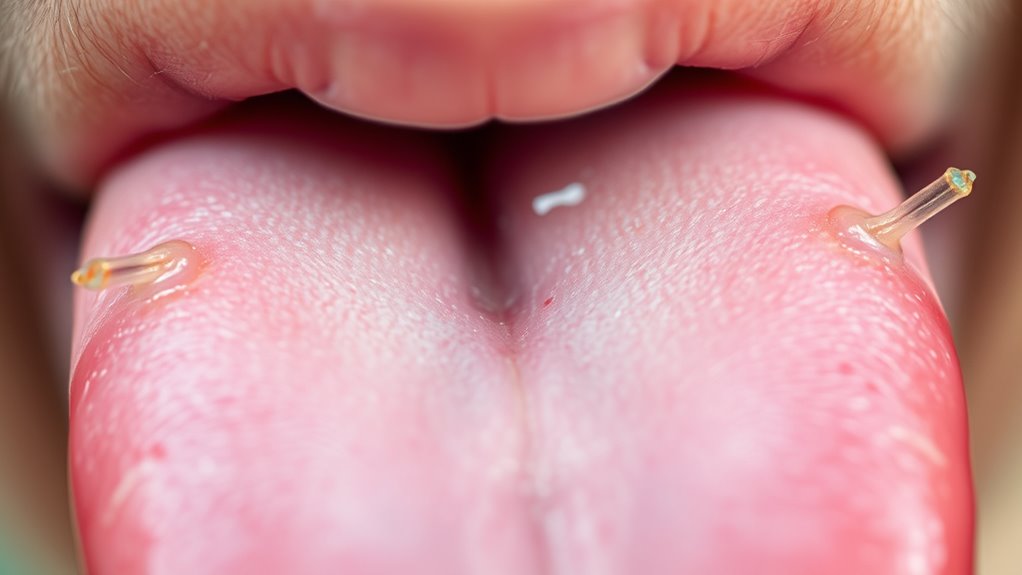Zinc plays a vital role in your taste and smell functions by supporting the health of taste buds and olfactory receptors, ensuring they communicate effectively with your brain. A deficiency can cause foods to taste bland or metallic and your sense of smell to weaken. Eating zinc-rich foods like seafood, nuts, and grains helps maintain peak levels. To learn how to protect your sensory health, discover the detailed ways zinc keeps your senses sharp.
Key Takeaways
- Zinc is essential for the development and renewal of taste buds and olfactory receptor cells.
- It acts as a cofactor for enzymes involved in transmitting taste and smell signals.
- Zinc deficiency can impair sensory perception, causing metallic tastes and reduced odor detection.
- Adequate zinc intake supports the structural integrity and responsiveness of taste and smell receptors.
- Consuming zinc-rich foods like seafood, nuts, and grains helps maintain optimal taste and smell functions.
How Zinc Supports Taste Bud Function

Zinc is essential for maintaining healthy taste buds, as it directly influences their development and function. Without enough zinc, your taste buds can become impaired, leading to a diminished ability to perceive flavors accurately. Zinc helps support the growth and renewal of taste receptor cells, which are constantly regenerating to keep your taste sensations sharp. It also plays a role in facilitating the communication between taste buds and your brain, ensuring signals are transmitted effectively. When zinc levels drop, this process slows down, causing taste disturbances or a loss of taste altogether. By maintaining adequate zinc intake, you help preserve the integrity of your taste buds, allowing you to fully enjoy the flavors in your food and stay alert to changes in taste perception.
The Connection Between Zinc and Olfactory Receptors

Your ability to perceive smells depends on the proper functioning of olfactory receptors, which are specialized nerve cells located in your nasal cavity. Zinc plays a vital role in maintaining these receptors’ health and activity. It acts as a cofactor for enzymes involved in olfactory signal transduction, helping convert odorant molecules into electrical signals your brain interprets as smell. Without enough zinc, these receptors may become less sensitive or degrade, leading to diminished olfactory function. Research suggests that zinc deficiency can impair receptor regeneration and reduce smell acuity. Ensuring adequate zinc intake supports the structural integrity and function of olfactory receptors. By doing so, you help preserve your ability to detect and enjoy a wide range of odors, maintaining your sense of smell’s sharpness and responsiveness.
Signs of Zinc Deficiency Affecting Sensory Perception

When zinc levels are low, you might notice changes in your sensory perception, especially in your ability to taste and smell. Foods may seem bland or less flavorful, making eating less enjoyable. You might also find that your sense of smell diminishes or becomes less sharp, affecting how you perceive odors. These signs can appear gradually and are often overlooked at first. You may experience a persistent metallic taste or difficulty identifying familiar tastes and aromas. Such changes aren’t just inconvenient—they can lead to decreased appetite and nutritional deficiencies. If you notice these symptoms, it could indicate a zinc deficiency impacting your sensory functions. Color accuracy in home cinema projectors influences how vibrant and true-to-life images appear, which can also subtly affect your overall sensory experience. Addressing the deficiency early can help restore your sense of taste and smell, improving your overall quality of life.
The Science Behind Zinc’s Role in Sensory Health

Zinc plays a vital role in how your sensory receptors function and communicate. By enhancing neural transmission, it helps your brain interpret taste and smell signals more effectively. When you’re deficient in zinc, this process weakens, leading to impaired sensory perception.
Zinc and Receptor Function
Zinc plays a vital role in the function of taste and smell receptors by acting as a cofactor for numerous enzymes involved in sensory perception. It helps maintain the structural integrity of receptor cells, ensuring they respond accurately to stimuli. Zinc influences the production and activation of key proteins within receptor cells, enabling proper signal transduction. Without sufficient zinc, receptor functions weaken, leading to diminished taste and smell sensitivity. You might notice that your sensory responses become less sharp or even dull if zinc levels drop. This is because zinc supports the synthesis of molecules essential for receptor signaling. By helping keep receptors functioning optimally, zinc guarantees you can perceive flavors and odors clearly, highlighting its critical role in sensory health. Proper zinc levels are especially important during sensory development in early childhood and adulthood.
Neural Transmission Enhancement
Understanding how your sensory signals travel from receptors to your brain reveals zinc’s essential role in neural transmission. Zinc helps facilitate communication between nerve cells by supporting the function of enzymes involved in transmitting signals. It stabilizes the synaptic activity, guaranteeing signals move efficiently across nerve junctions. Without adequate zinc, nerve impulses may slow down or become disrupted, impairing your ability to perceive taste and smell accurately. Zinc also influences neurotransmitter release, which is fundamental for transmitting sensory information to your brain. By maintaining proper neural function, zinc ensures your senses remain sharp and responsive. This enhancement of neural transmission highlights why sufficient zinc levels are imperative for preserving the integrity of your taste and smell pathways.
Deficiency Impact on Senses
Have you ever noticed how a zinc deficiency can dull your senses of taste and smell? When your zinc levels drop, your sensory receptors weaken, leading to decreased perception of flavors and odors. This deficiency hampers the function of zinc-dependent enzymes essential for sensory cell renewal and signal transmission. The impact varies, but common signs include a persistent metallic taste or a reduced ability to enjoy food and scents. The table below highlights how zinc deficiency affects different aspects of your senses:
| Sensory Aspect | Effect of Deficiency | Underlying Cause |
|---|---|---|
| Taste | Dullness, metallic | Impaired receptor function |
| Smell | Reduced sensitivity | Damaged olfactory neurons |
| Cell Renewal | Slowed regeneration | Decreased enzyme activity |
| Signal Transmission | Weakened signals | Zinc-dependent neural pathways |
| Overall Perception | Blunted experience | Combined sensory impairments |
Recognizing these signs can prompt timely intervention to restore your senses through zinc supplementation. Additionally, cultural influences can sometimes affect awareness of nutritional deficiencies and their effects on health.
Dietary Sources Rich in Zinc

You can boost your zinc intake by including seafood like oysters, crab, and shrimp in your meals. Plant-based options such as beans, nuts, and whole grains also provide valuable zinc sources. Additionally, many fortified foods, like cereals and snacks, are enriched with zinc to help meet your daily needs. Incorporating plant-based ingredients like soy products and pumpkin seeds can further support your zinc levels.
Zinc-Rich Seafood Options
Seafood is one of the best natural sources of zinc, providing essential nutrients that support taste and smell functions. Oysters top the list, offering extremely high zinc levels per serving, which can notably boost your intake. Crab and lobster also provide substantial amounts, making them excellent choices for increasing zinc naturally. Sardines and mackerel are not only rich in zinc but also offer omega-3 fatty acids, supporting overall health. Consuming these seafood options regularly can help improve zinc levels, especially if you have deficiencies affecting your senses. Remember to include a variety of seafood in your diet to maximize nutrient intake. Cooking methods like steaming or grilling preserve zinc content while keeping the flavors fresh and appealing.
Plant-Based Zinc Sources
Curious about plant-based sources that can enhance your zinc intake? You’ll find several vegetarian options to help meet your needs. Legumes like chickpeas, lentils, and beans are excellent choices, providing a good amount of zinc per serving. Seeds such as pumpkin, sunflower, and hemp seeds add a nutritious punch and are easy to incorporate into meals or snacks. Nuts, including cashews and almonds, also contribute zinc while offering healthy fats. Whole grains like oats, quinoa, and fortified cereals help boost your intake and provide additional fiber and nutrients. Incorporating these foods into your diet ensures you get enough zinc to support your taste and smell without relying solely on animal products. Keep a variety of these plant-based options handy for balanced nutrition. Additionally, choosing foods with nutrient tracking features can help you monitor your zinc intake more accurately.
Fortified Food Products
Fortified food products offer a convenient way to boost your zinc intake without relying solely on natural sources. These foods are enriched with zinc during processing, making it easier to meet your daily needs. You might find fortified cereals that contain up to 15 mg of zinc per serving, perfect for breakfast. Dairy products like milk and yogurt are often fortified, providing an easy way to incorporate zinc into your diet. Additionally, snack bars and energy drinks sometimes include added zinc to support your immune and sensory health. By choosing these fortified options, you can efficiently increase your zinc intake, which is essential for maintaining your taste and smell functions. High zinc content in fortified foods helps ensure you reach your recommended daily intake more easily. Always check labels to ensure you’re getting a meaningful amount of zinc in your fortified foods.
Daily Zinc Intake Recommendations

The recommended daily zinc intake varies based on age, sex, and individual needs, but generally, adults should aim for about 8 to 11 milligrams per day. Men typically need around 11 milligrams, while women require about 8 milligrams, especially during pregnancy or breastfeeding when needs increase. Consuming a balanced diet that includes zinc-rich foods like meat, shellfish, dairy, nuts, and legumes helps meet these guidelines. Too little zinc can impair immune function and affect your senses of taste and smell, while excess intake can cause adverse effects such as nausea or copper deficiency. It’s essential to monitor your intake and consult with a healthcare professional if you suspect a deficiency or plan to take supplements. Maintaining proper zinc levels is also linked to adequate absorption and overall health. Meeting these recommendations supports your overall health and sensory functions.
Factors That Can Lead to Zinc Deficiency

Several factors can contribute to zinc deficiency, especially if your diet lacks sufficient zinc-rich foods or if your body has trouble absorbing the mineral. First, poor dietary intake limits zinc availability, common in restrictive diets or those low in meat, seafood, and legumes. Second, certain health conditions, like gastrointestinal disorders, impair zinc absorption, making it harder for your body to utilize it effectively. Third, increased zinc loss occurs due to factors such as chronic infections, burns, or medication use, which can deplete your zinc stores quickly. Additionally, age, alcohol consumption, and certain genetic conditions can also influence zinc levels. Recognizing these factors helps you understand why you might experience deficiencies, potentially affecting your taste and smell senses. Astrological signs have also been linked to personality traits and attractiveness, which can influence social interactions and self-esteem, indirectly impacting overall well-being.
Strategies to Maintain Optimal Zinc Levels

To maintain peak zinc levels, focusing on a balanced diet that includes zinc-rich foods is essential. Incorporate sources like lean meats, shellfish, dairy products, nuts, seeds, and whole grains into your meals. These foods provide bioavailable zinc that your body can easily absorb. Avoid excessive consumption of phytate-rich foods like certain grains and legumes, which can inhibit zinc absorption. If you’re unable to get enough zinc from diet alone, consider a healthcare professional-recommended supplement. Keep in mind that taking too much zinc can cause adverse effects, so don’t exceed recommended doses. Staying hydrated and managing overall nutritional health also support zinc absorption and utilization. Regularly monitoring your zinc levels can help you maintain ideal taste and smell functions. Additionally, understanding the impact of zinc deficiency on sensory functions can motivate you to maintain proper levels for overall well-being.
Frequently Asked Questions
Can Zinc Supplements Improve Taste and Smell in Healthy Individuals?
If you’re wondering whether zinc supplements can enhance your taste and smell, the evidence is mixed. In healthy individuals without deficiencies, taking zinc likely won’t improve these senses considerably. Your body needs zinc for proper function, but excess won’t boost your senses beyond normal levels. Focus on a balanced diet to maintain adequate zinc, and consult a healthcare professional before starting supplements.
Are There Any Risks Associated With Excessive Zinc Intake?
When considering zinc intake, you should be aware of potential risks from taking too much. Excessive zinc can cause nausea, vomiting, and diarrhea, and may impair your immune system or lower your copper levels. You might also experience copper deficiency if you overload on zinc. To stay safe, stick to recommended doses and consult a healthcare professional before using high-dose supplements.
How Quickly Can Zinc Deficiency Symptoms Be Reversed?
When you address a zinc deficiency, symptoms like taste and smell issues can improve fairly quickly, often within a few weeks. Your body starts replenishing zinc levels once you increase intake through diet or supplements. However, the speed of recovery varies based on how severe the deficiency was and your overall health. Consistency is key, so stick with your recommended zinc intake to see the best results.
Do Other Minerals Interact With Zinc to Influence Sensory Function?
Think of your body’s minerals as a well-orchestrated symphony, each playing its part to produce harmony. Other minerals like copper and iron dance with zinc, sometimes competing or cooperating, impacting your sensory functions. A delicate balance is key; too much copper can mute zinc’s effects, while adequate iron supports nerve health. You need to nurture this mineral orchestra for your senses to stay sharp and responsive.
Is Zinc Deficiency More Common in Certain Age Groups or Populations?
You might notice that zinc deficiency is more common in certain age groups or populations. Older adults often face higher risks due to reduced dietary intake and absorption issues. Vegetarians and vegans may also be more susceptible because plant-based diets sometimes lack sufficient zinc. Additionally, people with certain health conditions, like gastrointestinal disorders, are at increased risk. Recognizing these groups helps you understand who might benefit from zinc-rich diets or supplements.
Conclusion
By balancing your intake of zinc, you bolster your body’s ability to taste and smell. Prioritize prudent food choices, practice proper planning, and prevent pitfalls that impair perception. Remember, maintaining mindful moderation in zinc consumption can make a meaningful difference in your sensory health. Stay vigilant, value vitality, and venture into vibrant flavors and fragrances — your senses will thank you for taking charge today.









